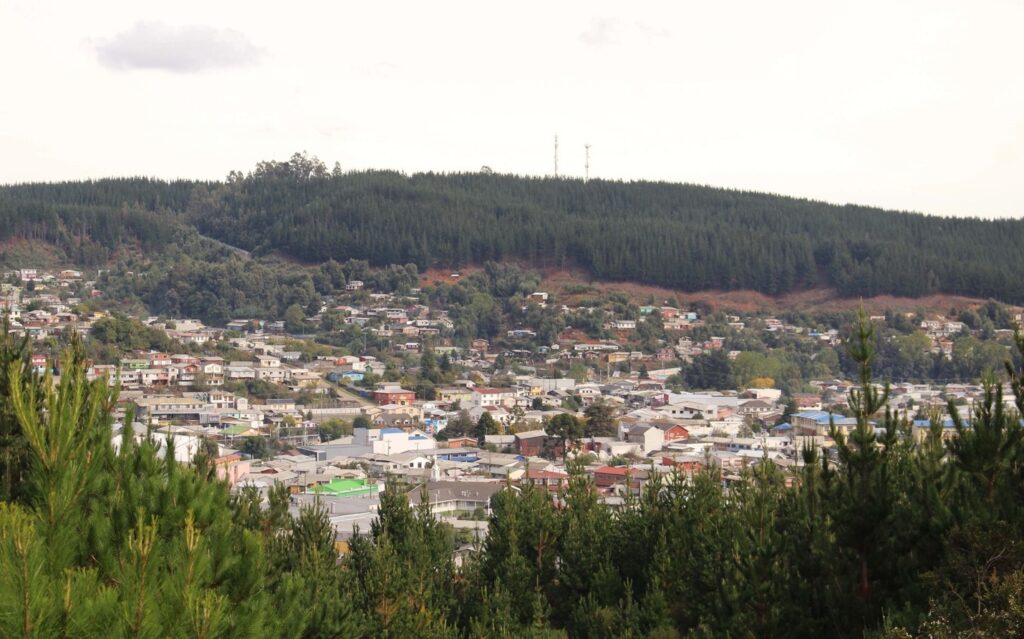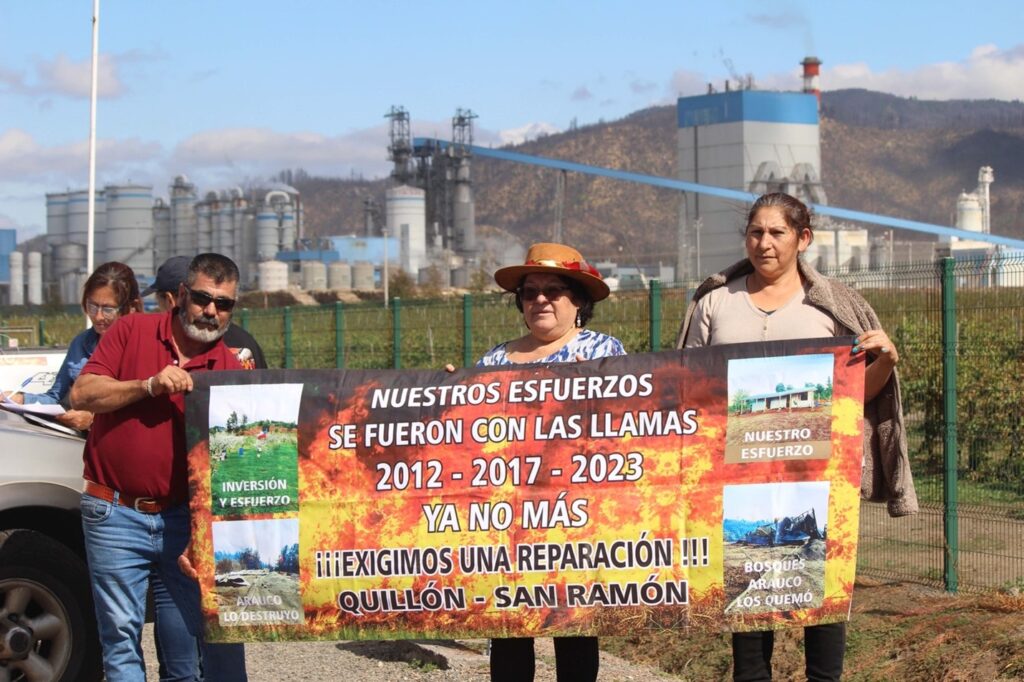A Biofuelwatch investigation, in collaboration with BankTrack, the Environmental Paper Network (EPN), Global Justice Ecology Project, the Global Forest Coalition (GFC), and Chilean digital media platform Resumen.
Arauco, a Chilean based transnational timber industry giant, has a long history dating back to the 1970s of social conflict and environmental damage. Yet it continues to receive financial backing – and a layer of corporate legitimacy – from Vanguard, its largest institutional investor. Together with BlackRock, the two US-based asset managers own hundreds of millions of dollars’ worth of stock in COPEC SA, the sole proprietor of Arauco. The below investigation serves as a case study of the impacts on human rights and the environment that can be traced to the investment decisions of the world’s biggest asset managers.
Arauco has fostered the expansion of monoculture tree plantations across Southern Chile, and indeed across South America as a whole, with extensive operations in Argentina, Brazil, Colombia, Uruguay, México, the United States, and other countries. In Chile, Arauco owns nearly 1,000,000 hectares (2.5 million acres), with a large majority of those lands now hosting monoculture tree plantations of exotic species.

This plantation forestry model has catastrophic environmental impacts, devastating native forests and biodiversity, damaging watershed hydrology and intensifying water scarcity, and increasingly creating flammable landscape scale conditions that facilitate extreme wildfire behaviors and result in deadly climate change charged fire storms.
Aside from the environmental impacts associated with these plantations, the extreme concentration of land ownership has been the source of increasingly intense social conflict with rural campesino and indigenous Mapuche communities.
Arauco has a legacy of land conflicts that dates back to the Pinochet military dictatorship, which distributed hundreds of thousands of acres of land to the plantation companies without consultation or compensation for the rightful owners, many of which were indigenous Mapuche people. Arauco works to deny the existence of the conflicts, but a legacy of dispossession and forced removal is inextricably intertwined with the expansion of the Arauco plantation empire over the decades. The regions that have been converted to the exotic pine and eucalypt plantations are now among some of the poorest areas of the country.

The economic desperation in communities that have seen a majority of land transferred to the ownership of big companies like Arauco and converted to industrial monoculture plantations, gravely affecting the livelihoods and traditions of an agriculture based rural economy, has resulted in serious social conflict. There have been numerous instances of Arauco’s logging machinery, trucks, and installations having been sabotaged and burned in aggressive direct action by Mapuche resistance groups.
The conflict has been intensified by the subsequent militarization of Mapuche territories, as the Chilean state intervenes to protect the economic assets of big landowners like Arauco, resulting in the aggressive criminalization of Mapuche resistance groups and community organizations. Many leaders of Mapuche communities have been imprisoned, and there have been numerous cases of extrajudicial assassinations of Mapuche militants and environmental defenders. The cycle of violence trends upwards, catching many bystanders in the crosshairs.
Repeatedly, the accusations of involvement of specific individuals in illegal activities have been spurious and unsubstantiated, but have been used in court to sentence Mapuche activists to long prison sentences. Serious questions are being raised regarding how the proceedings and evidence have been manipulated to secure convictions of a long list of Mapuche political prisoners.

Despite the legacy of conflict, Arauco is active on the global stage with an assertive strategy of public perception management. Arauco is a regular corporate participant at the United Nations climate talks, and claims to be the world’s first ‘carbon neutral’ timber company. And even though academic scrutiny and civil society research has provided data that raises many concerns about the environmental viability and economic repercussions of the plantation forestry model, Arauco enjoys the protection of high-profile sustainability certification schemes such as the Forest Stewardship Council, providing the company with a certified green sheen that they have been able to maximize with an exceptionally sophisticated public relations campaign.
Considering the historical patterns of controversy, contrasted with the company narrative of being renewable, sustainable, and an ideal corporate neighbor, our team of researchers decided it was an imperative to get on the ground once again to document the real-world impacts of the hundreds of millions of dollars that Vanguard and BlackRock are holding in the business group that exercises complete control over Arauco.

In April 2024, with the support of the digital media platform Resumen, an independent online news outlet based out of Concepción in southern Chile, Biofuelwatch staff were able to travel through the heart of the region that Arauco dominates as the geographical core of their international business. The delegation was able to confirm that the negative impacts Arauco is having on communities and the environment are intensifying.
The following introductory selection of photos that came out of this brief trip offer a contemporary glimpse into what is really happening on the ground, exposing harsh realities that Arauco and Vanguard would much rather that no one knows about, and which Arauco actively works to make invisible to the world at large.
Proyecto Mapa
Proyecto MAPA, in the Provincia de Arauco, is a massive industrial complex right on the shores of the Pacific Ocean that is the production cornerstone of Arauco’s global pulp and wood products empire. Saw mill and panel manufacturing operations are only a small part of this recently expanded complex that is now the largest pulp producing facility in Chile, exporting more than 2.1 million tons a year of kraft pulp to foreign markets.

Proyecto MAPA also includes the largest biomass power plant in Chile (160 MW). Air quality and water quality issues are acute near the complex, and local residents can no longer rely on wells for their water because of the toxic contamination. However, neither Arauco nor the government have worked to systematically identify water pollution causes, nor develop a substantive plan for mitigation.
An anecdote is that the landing strip visible in the lower right of the above photo becomes very active during wildfire season. Neighbors told us that the air tanker planes used to fight fires need to dump whatever water and fire retardant might remain in the tankers right before they land, affecting neighboring properties. The chemical cocktail that makes up the fire retardant has never been disclosed by Arauco to residents whose properties are impacted by practices at the airstrip, despite repeated attempts by the community to get that information.

Industrial exotic species monoculture tree plantations are often justified as a climate solution, first referred to as carbon ‘sinks’ and now often characterized as ‘carbon dioxide removal’, packaged up as carbon credits for trade as offsets. Inevitably, however, all industrial tree plantations are destined for harvest, and the scorched earth practices that Arauco follows in the field might be certified as sustainable by the Forest Stewardship Council, yet the biodiversity, soil, water, and climate impacts of these practices are immense and cannot be compensated for by another planting of a rapid growing exotic species that will be destined for harvest once again.
This intensive cycle is not viable in the long term. Even many industry voices have voiced concern that after 2 or 3 rotations of these industrial practices, exotic tree species may not be able to be grown on this spent and devastated land, which once hosted globally unique temperate rainforests, host to species found nowhere else on the planet.
Millions of acres of land are committed to the plantation forestry model, but the impacts are hidden from view. These are not the images that Vanguard includes in its television spots.

Curanilahue is a small city that is totally encircled by monoculture plantations. At least in this instance one can see the crude ‘fire break’ in the background of the photo, offering at least a few meters of open ground between the plantation and the urban zone in case of fire. All of this land around Curanilahue belongs to Arauco, creating huge tensions between the residents and the company.
Of the entire jurisdiction of Curanilahue, more than 80% of the available land belongs to Arauco, and more than 60% is planted as either pine or eucalypt. Many people who live in Curanilahue can remember when they could still harvest and collect from the native forest, but the substitution of the native forest by plantations has transformed the landscape and rural traditions completely.
San Ramón demands compensation

The Nueva Aldea pulp plant of Arauco smokes away above the valley of the Itata River. In February 2023, plantation fueled wildfires ripped through the area, burning hundreds of thousands of acres in a matter of days. The homogenous monoculture creates highly flammable conditions across the landscape; on top of that both the pine and eucalypt species are adapted by fire and have evolved to burn. However, Chile’s native forests did not evolve with fire. The February 2023 firestorms literally exploded across the region. Many local residents lost everything.
February 2023 was not the first time that residents of San Ramón had been impacted by wildfires fueled by Arauco’s land management practices. Residents are organizing and working to make their situation visible. When we were there, they took us to the gate of the Nueva Aldea pulp plant, and they delivered a letter to Arauco explaining once again their claims against the company.

Native forests under siege
A remnant of the ancient araucaria forest can still be found in the Nahuelbuta National Park, an internationally important but highly stressed pocket of remaining native forest. This is a living reminder of what has been lost to the massive expansion of the plantation forestry model.

In consideration of this evidence, the research coalition demands that Vanguard retreat from offering corporate legitimacy to Arauco by divesting from COPEC, SA. Such a decision would be but a small step on the path that Vanguard must follow to responsible investing, but the significance of this divestment cannot be ignored.
